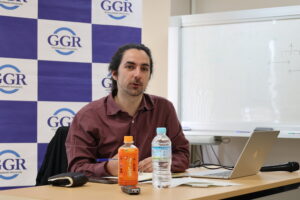On April 25, 2025, the Institute for Global Governance Research (GGR) at Hitotsubashi University hosted a Talk Session titled “Economic Expectations and Attachment to the European Union After the Invasion of Ukraine: A Reappraisal Using Observational and Experimental Evidence” featuring Mr. Luis Russo, Ph.D. candidate, Social and Political Sciences, European University Institute.
Mr. Russo began his talk by highlighting how the Russian invasion of Ukraine has reignited debates on EU identity and integration. He explored how economic, cultural, and security narratives influence public attachment to the EU during crises. Reflecting on the EU’s history of crisis-driven integration, he noted the persistent tension between expanding EU authority and stable national identities. Unlike previous crises, the Ukraine war is external and shared, generating greater demand for EU-level policymaking and strengthening supranational bonds, as noted by Ferrera and Kriesi (2022) and Kyriazi et al. (2023). This challenges the belief that national self-rule conflicts with EU integration.
The speaker emphasized two key arguments: first, economic considerations are the strongest predictors of EU attachment; second, framing the EU in economic terms has more impact than cultural or security narratives. The Ukraine crisis has led citizens to see the EU as a stabilizing force. Data from 2022 showed those linking the EU to prosperity expressed stronger support. Positive economic framing was most persuasive, while populist negative messaging had little effect. Russo concluded that EU institutions should highlight economic benefits and recovery policies to strengthen public support and legitimacy.
During the Q&A, a participant asked how the speaker’s security framing relates to securitization theory, and whether the cultural dimension actually reflects security concerns. Mr. Russo responded that people often evaluate the EU through their national governance lens. What seems like a cultural concern particularly around immigration is usually about security, as cross-border movement is often seen as a threat to national cohesion before blending into national culture.
The speaker concluded that economic expectations now largely shape EU attachment, offering a practical path to strengthen the Union’s legitimacy amid ongoing crises.
[Event report prepared by] Billal Hossain (Doctoral student, Graduate School of Law, Hitotsubashi University)

